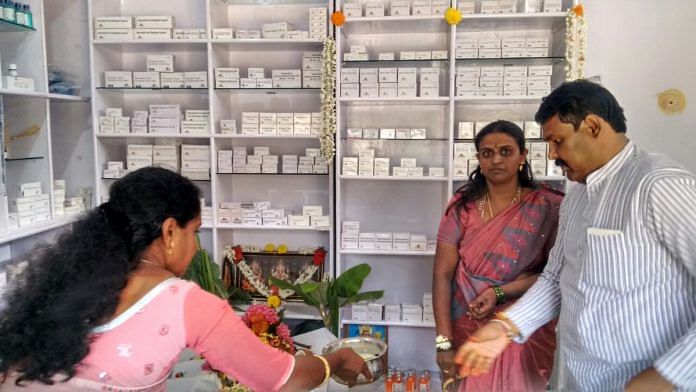The government has begun to refocus on the Jan Aushadhi Yojana, through which it provides generic medicines at affordable rates.
New Delhi: The Modi government is now reviving an ailing UPA-era healthcare scheme, which promised quality generic medicines at affordable prices, as it looks to supplement Ayushman Bharat — its flagship health insurance initiative — ahead of the 2019 Lok Sabha elections.
The BJP-led government had relegated the Pradhan Mantri Bhartiya Janaushadhi Pariyojana (PMBJP) — first launched by the UPA in 2008 but repackaged by the NDA in 2015 — as it has been struggling to live up to its promise due to frequent quality lapses and stock shortages. Instead, the Prime Minister’s Office (PMO) had begun promoting Ayushman Bharat.
The government’s renewed interest in PMBJP, earlier known as the Jan Aushadhi Yojana, stems from the fact that the scheme has made a turnaround, with reduced quality complaints and increased product availability across the 4,600 state-owned outlets set up to sell the generic medicines.
As a result, the BJP-led government is planning to celebrate ‘Jan Aushadhi Diwas’ during the last week of January.
“Regaining the confidence in the scheme, the PMO is considering a proposal to celebrate Jan Aushadhi Day,” said a top government official from the department of pharmaceuticals (which falls under the Ministry of Chemicals and Fertilisers), which runs the scheme. “They are checking the availability of PM Modi during the last week of January,” the official added.
Expansion, new products on the cards
Under PMBJP, the department of pharmaceuticals sells the generic medicines through the Bureau of Pharma PSUs of India (BPPI). The scheme was re-launched by the Modi government in 2015 but it had been struggling.
According to the BPPI, however, no quality problem has been reported in the last two months against (at least) one recall every month. Buoyed by the turnaround, the BPPI now plans to increase the number of products being sold in the stores, from the current 913 products to 1,000 by February.
The government also wants to expand the scheme from just generic medicines to products such as pregnancy-testing kits, baby and adult diapers and nicotine replacement pills, among others.
“The PM office had fine-tuned Jan Aushadhi Yojana before re-launching the sick scheme from UPA era,” the ministry official quoted above said. “In the coming months, it will be one of the top schemes along with Ayushman Bharat that would be promoted in the election campaign.”
BPPI CEO Sachin Singh told ThePrint that the new products would be at least half their market price. “The products will be available for at least 50 per cent lesser price,” Singh said, adding, “We have been tying up with multinational drug makers and top Indian pharma companies to get these products for our stores.”
For instance, Singh said that the government’s pregnancy testing kit, ‘Ankur’, would be available for Rs 20 as against the average price of Rs 50 whereas the adult diaper ‘Swabhiman’ would be available for Rs 140 as against Rs 280 for five pieces.
Also read: Modi govt’s ailing affordable drugs scheme may get a new lease of life at private chemists
The turnaround
The turnaround in BPPI is being credited to CEO Singh, an MBA-turned-Indian Revenue Service (IRS) officer who took over in May.
Since taking over, Singh, a former area credit manager at ICICI Bank and associate vice-president at Indiabulls, has fired 28 of the BPPI’s 97 employees in the last six months.
“While we are hiring young professionals, there are many more employees who will be fired in the coming months after the closure of the audit which is ongoing since August,” Singh told ThePrint.
The government had ordered another audit after ThePrint reported lapses in the scheme highlighted by the former’s internal audit committee, the office of the chief controller of accounts.
The audit had highlighted misappropriation of funds, excess spending and poor quality control between 2014-15 and 2016-17.
Also read: No one to control quality, jan aushadhi forced to recall 6 batches of drugs in 3 months



